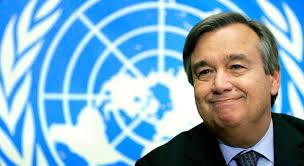![]() UN environmental report: Response to
UN environmental report: Response to
Secretary-General Antonio Guterres
Le Figaro/Tribune published october 31, 2018 - The latest UN environmental reportrecommends that governments change their economic models and you sound the alarm bell: "If we do not change course by 2020, we risk missing the point where we can avoid runaway climate change, with disastrous consequences for people and all the natural systems that sustain us". However, it is important to be realistic. Heads of state want more growth, companies do not like constraints and consumers do not change their habits much. From the first COP co-organized by the UN in Geneva in 1979 to the Paris Agreements in 2015, environmental policies have been ineffective. Admittedly, the polluter-pays principle that appeared in 1972 may seem justified, but the punitive ecology that systematically recommends taxation cannot constitute a relevant environmental policy and can only divide nations, especially since its application is uneven and disordered. The acceleration of environmental degradation is one of the consequences of the deregulation of world trade promoted by international organizations that now promise apocalypse. We need to break the ideological deadlock. After 23 COP It is time to draw conclusions and take a new look. Only a fair policy could be understood. In a globalized world, solutions must sometimes be global.
"The low-cost economy favours consumerism and is an ecological, economic and humanitarian anomaly"
To restore a more qualitative and sustainable consumption, we must therefore intervene upstream on the economic mechanisms that generate this situation. Adjustments could make it possible to initiate a new business model naturally and flexibly. One of our many tasks would be to find a balance between the different imperatives. We would then have to determine the most appropriate global minimum wage level for each of the 5 to 7 categories that would include all the countries concerned, sometimes with delayed progress. The amount set, which would only concern workers producing goods and services for export to the United States and the EU in the first few years, should be high enough to reduce poverty without causing economic disruption. A reasonable level would gradually influence the disposable culture. This work, although we have already made estimates, would require several hundred comprehensive studies and country-specific consultations. It would be complex and considerable but essential because it would secure the paradigm shift and guarantee States and companies, but also consumers, a gradual transition under the best conditions. All relevant economic and social parameters should be taken into account and the various scenarios objectively considered.
 A large part of the analyses and preparatory work would be carried out within a dedicated structure located in Europe and the USA. Based on a common methodology, economic studies and projections would be carried out by university economic research departments that would like to be involved in this historical project. In order to complete our work in less than two years, we could also use several international specialized firms and recognized associations of economists. In addition, as soon as the first measures are applied, an internal observatory would analyze developments. Subsequently, in the light of a new economic and philosophical reading, other solutions complementary and comparable to that of the global minimum wage would emerge. Our world could thus gradually and positively transform itself. We would probably consume less but better. In the long term, artisanal or local production could more often compete with less sustainable industrial products and tens of millions of families could make a living from them. The question of overcrowding would find answers because the world minimum wage would promote the education of children, the emancipation of women and thus a reduction in birth rates.
A large part of the analyses and preparatory work would be carried out within a dedicated structure located in Europe and the USA. Based on a common methodology, economic studies and projections would be carried out by university economic research departments that would like to be involved in this historical project. In order to complete our work in less than two years, we could also use several international specialized firms and recognized associations of economists. In addition, as soon as the first measures are applied, an internal observatory would analyze developments. Subsequently, in the light of a new economic and philosophical reading, other solutions complementary and comparable to that of the global minimum wage would emerge. Our world could thus gradually and positively transform itself. We would probably consume less but better. In the long term, artisanal or local production could more often compete with less sustainable industrial products and tens of millions of families could make a living from them. The question of overcrowding would find answers because the world minimum wage would promote the education of children, the emancipation of women and thus a reduction in birth rates.
It is regrettable that the ILO has never succeeded in a century in establishing a global minimum wage that would certainly have moderated over-consumption and environmental damage during the proliferation of free trade agreements and the abolition of import quotas. Also, for the past 5 years, many people around the world have been following the evolution of the International Convention for a Global Minimum Wage project. American academics have expressed interest since the first publications. Today our network already includes more than a thousand economists, researchers and professors in economics often from prestigious universities in the United States and most of whom seem to be in favour of the project or at least a reflection on our proposals.
The program does not obey any dogma and could federate. It responds to the issues expressed by the UN or formulated in Davos by the bosses of the largest companies who were concerned in 2018 for the second year running about the possible consequences of the "global fracture" “global fracture” and "rising inequality" but also to the conclusions of the report published by NASA in 2014, which highlighted the risk of seeing our industrial civilization disappear if we do not fight "the unsustainable resource exploitation and increasingly unequal wealth distribution". Our project could today constitute one of the few, if not the only, comprehensive, pragmatic and structuring economic proposal likely to reduce both environmental damage and inequality in the long term.
Francis JOURNOT - International Convention for a Global Minimum Wage
Copyright © 2013 - 2018 - non profit NGO International Convention for a Global Minimum Wage & Francis Journot Fair Consulting - All rights reserved
Make a free website with emyspot - Signaler un contenu illicite sur ce site
























